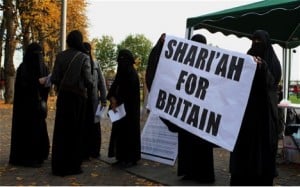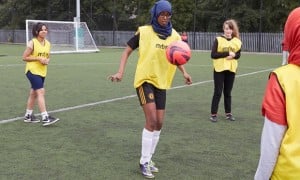by Nina Trige Andersen
nan@information.dk
Fatemeh Fakhraie wanted a voice and a place for critique of the way she and her sisters are pictured in the media. Muslimah Media Watch has become that space, a blog where stereotypes of Muslim women are challenged, discussed and criticized on daily basis.
“In the media, most Muslim women are treated as silent, oppressed victims of their religion or cultures, or treated as mysterious and sexual beings. Recently, the idea that Muslim women are dangerous has been added to the mix, with a host of stories about female suicide bombers appearing in mainstream media outlets,” says Fatemeh Fakhraie, who identifies as a biracial Muslim woman who lives in the United States.
“Nonexistent or negative media images serve to reinforce the idea that a group is inferior. When Muslim women in the west do not see themselves portrayed positively – or at all – in the media, they feel that they are not part of the culture they live in, they feel that the dominant western culture does not accept them as neighbors and colleagues. It’s very damaging to feel like you’re not at home in the place you were born or have grown up in,” Fakhraie says.
Together with three other Muslim women, Melinda, Zeynab and Duniya, Fakhraie discusses media stories with the hundreds of people who visit the blog.
Suicide bombers
In January, stories about ‘sexy bombers’, the Canadian TV show Little Mosque on the Prairie, reviews of the book Girls of Riyadh (also reviewed in Information on January 17th) and the Republican candidate running for president, Rudy Giuliani’s ‘Islamophobic campaign’ have, among others, been analyzed and discussed.
The story about the ‘sexy bombers’, published on the Italian news site Adnkronos International, was about the Filipino militant Islamic group Jemaah Islamiyah having started to use female suicide bombers.
“What makes these bombers sexy? They’re Muslim women. Yeah, that’s it. The story doesn’t mention why they’re termed sexy: do they wear sensual perfume and heavy makeup to entice victims? Do they wear revealing clothes so that victims are disarmed by their supposed physical charms? We’ll never know. The story only reports them as female members of an Islamic group in the Philippines. I guess the only requirements for being a sexy bomber are being Muslim and having a vagina,” writes Zeynab, and Melinda answers:
“A woman blowing herself up? Soooo sexy.”
Prejudice and fear
Fatemeh Fakhraie makes the point that the stereotypes of Muslim women in the media indicates that western society is afraid of Islam and Muslims.
“Muslims are just people, just like anyone in Denmark or Italy or Canada. But attaching certain frightening stereotypes to labels like ‘Muslim’ make those in the west feel that Muslims are so different from them that Muslims are not even people,” says Fakhraie, who feels the consequences of the media stereotypes in her daily life.
“Non-Muslim people make assumptions about my religion, my nationality, or my ethnicities based on the stereotypes they see in the media. They assume that I should wear a certain type of clothing, or that I should believe in certain ideologies, or that I should like and dislike certain things or people. And it’s difficult to deal with sometimes,” says Fakhraie, hoping that the blog can help start some of the difficult conversations or change some minds.
Especially the discussion about the veil bothers her.
“I think that debates about coverings, in both Muslim and non-Muslim communities, have become larger in the west than they should be. Who cares what someone is or isn’t wearing? What a woman wears or doesn’t shouldn’t be a free pass to treat her differently, to not allow her into certain places or to excuse crimes against her,” says Fakhraie, who points that the assumption of the veil being oppressive in itself is “ethnocentric and Islamophobic.”
“Let a woman decide for herself what oppresses her; telling her what oppresses her without listening to her viewpoint is oppression in itself,” Fakhraie says. “Personally, I do not interpret the Holy Qur’an to mandate a headscarf, only to dress modestly. But this is my personal interpretation, and I don’t have a right to force that on anyone else. I respect and defend my sisters’ rights to wear – or not wear – whatever they want.”
Fakhraie criticizes what she calls “sanctioned intolerance” toward those who do not belong to the majority. “Harassment, bans, and institutional discrimination against women who wear or do not wear a piece of clothing are not acceptable, and they are not features of a liberal society.”
Middle-class feminism
Even in the feminist communities Fakhraie has had the experience of being alienated.
“I came to identify as a feminist because I’ve had strong female role models in my family relationships and friendships. But there have been very negative experiences, as well. Most of these experiences deal with white, western, middle-class feminism and its view of any other type of feminism as aberrant or inaccurate,” Fakhraie says, and as example she mentions experience of visiting feminist panels on race or globalization, and find all the speakers to be white, or seeing Muslim women in feminist publications only as victims of war.
“I think that feminism is equality; the idea that we – women, men, whoever – all deserve respect and equality with each other. That also includes understanding,” Fakhraie says, and explains: “Different people have different ideas of liberation, and sometimes western feminism ignores that. If we want to help anyone, we need to listen to those who need help and offer them help on their own terms. If a feminist group wants to help a village, it’s silly to focus things like head scarves when the women of the village want clean drinking water or education for their children.”













